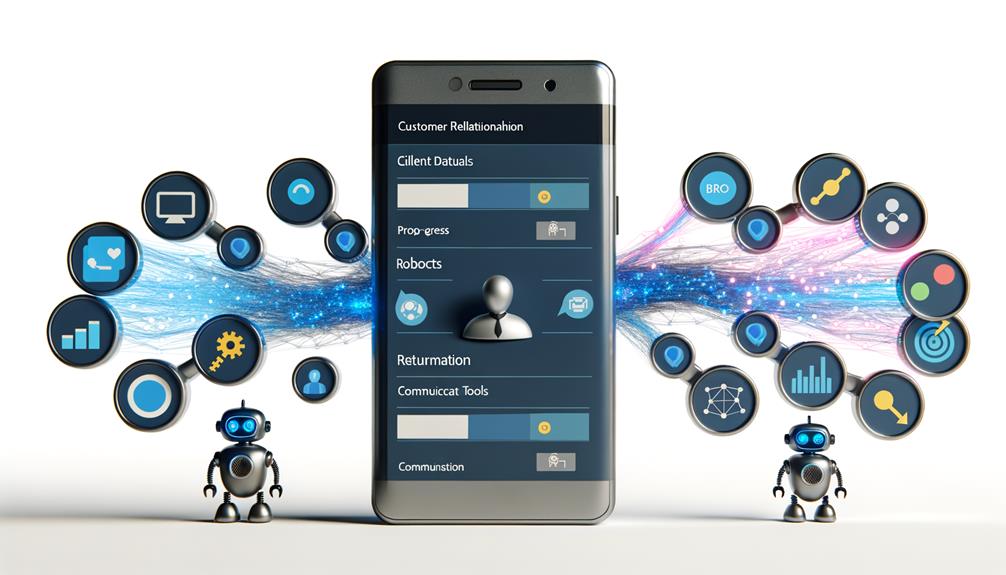You're working hard to integrate AI into your CRM, aren't you? The complexities of system compatibility, scalability, and data synchronization can be challenging. However, with clear objectives, the right tech infrastructure and data management strategies, they're conquerable. Standardizing data structures and using APIs for real-time transfer are beneficial. A pilot project could simplify the process. Regardless of the hurdles, remember data security and compliance. A skilled workforce is indispensable too. Keep at it, and soon, these challenges will transform into a more efficient, data-driven workflow with enhanced customer interactions. Imagine the insights waiting just a few steps further.
Understanding AI-CRM Integration Landscape

In today's tech-driven era, grasping the landscape of AI-CRM integration is essential to streamline your business operations and enhance organizational effectiveness. AI integration into CRM systems can transform how you interact with your customers, offering invaluable insights and predictive analysis that can shape marketing strategies and decision-making processes. However, challenges businesses face include system compatibility, scalability, and the need for skilled personnel.
For successful integration, you'll need a robust tech infrastructure such as cloud-based platforms and API-driven architectures. It's also vital to define clear objectives and assess your data readiness before proceeding. Don't forget to engage stakeholders throughout the process. Remember, understanding the AI-CRM landscape isn't a one-time task, but an ongoing commitment to stay ahead of the curve.
Addressing Compatibility Challenges

You're about to tackle the compatibility challenges that occur in AI-CRM integration. You'll need to grasp the complexities of aligning disparate systems and technologies, along with standardizing data structures and formats. Ensuring the scalability and reliability of integration tools like APIs and middleware is also essential for successful compatibility.
Understanding Compatibility Issues
When addressing compatibility challenges in AI-CRM integration, it's important to take into account potential issues stemming from mismatched data formats and structures. Your focus should be on ensuring seamless data exchange between CRM systems and AI tools. When these two can't communicate with each other, it hinders integration. One way to overcome these compatibility issues is by using APIs, webhooks, or middleware for data synchronization.
Here's a quick overview of potential issues and solutions:
| Potential Issues | Solutions |
|---|---|
| Mismatched data formats | Standardize data formats |
| Lack of interoperability | Use APIs or middleware |
| Incompatible legacy systems | Upgrade or replace legacy systems |
| Data not aligned with AI algorithms | Align data with AI algorithms |
| Difficulty in data synchronization | Use webhooks or middleware |
Understanding these compatibility issues is the first step in overcoming them.
Resolving Integration Hurdles
Having grasped the potential compatibility issues, let's now shift our focus to resolving these integration hurdles, a vital step to enable a successful AI-CRM integration. Addressing these challenges involves precise data mapping to guarantee seamless data transfer between systems. This is where integration platforms like iPaaS and CRM connectors come into play. They streamline the data flow and enhance compatibility, assisting you in overcoming obstacles in data integration. However, synchronization issues can still arise, leading to inconsistencies and errors. To prevent this, you need to make sure your systems are well-aligned and updated regularly. By conquering these challenges, you'll enhance your customer relationship management (CRM), resulting in improved operational efficiency and customer interactions.
Simplifying Complex AI Integration

Exploring the maze of AI-CRM integration isn't a walk in the park; it requires a fine balance of understanding the intricate terrain, addressing compatibility issues, and scaling according to business needs. You're not just dealing with data and AI, but also grappling with complex integration challenges. Algorithm intricacies, compatibility issues, and the scarcity of skilled personnel can often complicate the process. But don't be discouraged. Start by defining clear objectives and evaluating your data readiness. Engage stakeholders and initiate pilot projects for hands-on experimentation. Remember, simplifying AI integration is about breaking down complexities into manageable tasks, leveraging your understanding of the AI-CRM landscape, and strategically maneuvering through the maze of integration.
Tackling Scalability Concerns

How do you manage scalability concerns in AI-CRM integration, especially with the growing demand for AI capabilities within CRM processes? Scalability concerns often stem from handling large datasets and ensuring algorithm performance at scale. Robust infrastructure scalability is a must to deal with these challenges. It's not just about having more storage or processing power, but also about efficient data management techniques. However, it's not all about technology. Skilled human resources play a significant role in managing AI systems and addressing scalability effectively. They are the ones who make sure that your AI-CRM integration scales up as your business grows, while maintaining efficiency and performance. Remember, scaling is not just a technical challenge; it's a business strategy that needs careful planning and execution.
Overcoming Data Integration Hurdles

When you're integrating AI with CRM, one of the trickiest parts can be overcoming data integration hurdles such as data synchronization issues, inconsistencies during the transfer process, and mismatch in data formats and structures. Not only does this necessitate a good understanding of your data, it also involves guaranteeing data quality, security, and compliance.
Here are some strategies to overcome these hurdles:
- Implementing effective data mapping to align data structures.
- Automating processes to minimize manual errors and inconsistencies.
- Using APIs for real-time data transfer to avoid synchronization issues.
- Regularly auditing data to maintain data quality.
- Embedding security measures to safeguard data confidentiality and comply with regulations.
With these steps, you'll be well on your way to successful AI-CRM integration.
Navigating Regulatory and Security Implications

As you incorporate AI into your CRM systems, understanding regulatory restrictions and implementing secure AI-CRM becomes paramount. It is crucial to grasp the complexities of data protection laws such as GDPR and HIPAA, while also focusing on stringent security measures to guard against cyber threats. This proactive approach not only helps you comply with industry-specific regulations but also strengthens your customer data, enhancing trust in your AI-powered CRM solutions.
Understanding Regulatory Restrictions
Exploring the maze of regulatory restrictions for AI-CRM integration, you'll find it's critical to thoroughly understand and comply with data protection laws such as GDPR and HIPAA. These regulations are not mere suggestions, but legal requirements to guarantee data privacy, highlighting the security implications of non-compliance.
To navigate these restrictions, consider the following:
- Understand the specifics of GDPR and HIPAA, as both laws have unique requirements.
- Regularly review changes to data protection laws to guarantee continued compliance.
- Implement robust security measures to prevent data breaches.
- Stay transparent with customers about how their data is managed.
- Incorporate data privacy regulations into your AI-CRM integration strategy.
Implementing Secure AI-CRM
While understanding the landscape of regulatory restrictions is essential, it's equally important to focus on the practical aspects of implementing secure AI-CRM systems, particularly in the face of regulatory and security implications. So, how do you tackle data security, privacy regulations, and compliance with industry standards?
Here's a simplified approach:
| Action | Benefit | Regulation |
|---|---|---|
| Implement encryption | Enhances data security | GDPR/HIPAA |
| Establish access controls | Prevents unauthorized access | GDPR/HIPAA |
| Monitor mechanisms | Detects data breaches | GDPR/HIPAA |
This way, you're not only safeguarding against cyber threats but also building trust with customers. Remember, proactive compliance is the key to successful, secure AI-CRM integration. It's more than just a technical necessity; it's a business imperative.
Preparing Workforce for AI Integration

To prepare your workforce for AI integration, it's important to understand that AI can be utilized to personalize training programs, analyzing individual learning styles and performance effectively. This approach promotes employee development and fosters a culture of continuous learning.
Consider the following as you prepare for AI integration:
- Use AI to analyze learning styles for personalized training.
- Leverage AI to enhance skill acquisition and boost job satisfaction.
- Employ AI tools to dynamically adjust training based on real-time data.
- Integrate AI into development processes for efficient and personalized learning.
- Utilize AI to optimize learning outcomes and meet specific training needs.



